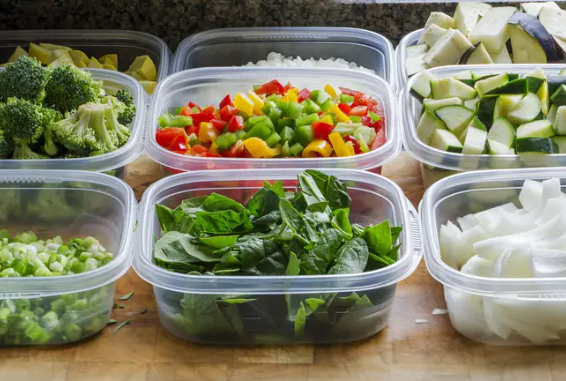
Meal planning and preparation are valuable strategies for maintaining a healthy diet and managing a busy lifestyle. By investing some time in advance, you can ensure that nutritious meals are readily available, saving time and reducing the temptation to resort to less healthy options. Here are steps to help you meal plan and prep efficiently:
1. Set Clear Goals:
Define your meal planning goals, whether it’s to save time, eat healthier, or reduce food waste. Having a clear purpose will help you stay motivated.
2. Create a Weekly Meal Plan:
Start by creating a weekly meal plan that includes breakfast, lunch, dinner, and snacks. Consider your schedule and preferences. Variety is key to prevent boredom.
3. Choose Balanced Recipes:
Select recipes that provide a balance of proteins, vegetables, and carbohydrates. Opt for meals that can be prepared in advance and reheated, like casseroles, stir-fries, and soups.
4. Write a Shopping List:
Based on your meal plan, create a detailed shopping list. Organize the list by sections in the store to save time and prevent impulse purchases.
5. Shop Smart:
Stick to your shopping list and avoid buying items that aren’t part of your plan. Purchase items with a longer shelf life, like frozen fruits and vegetables, canned goods, and grains.
6. Prep Fresh Ingredients:
Wash, chop, and portion fresh ingredients as soon as you return from the store. This makes it easier to assemble meals during the week.
7. Batch Cooking:
Designate a specific time for batch cooking, usually on a weekend or a day when you have more free time. Cook large batches of proteins, grains, and vegetables that can be used in multiple meals throughout the week.
8. Use Kitchen Appliances:
Consider using time-saving kitchen appliances like a slow cooker or Instant Pot. These can help you prepare meals with minimal effort.
9. Portion Control:
Use food containers to portion out meals and snacks for the week. This simplifies grabbing a pre-portioned, balanced meal when you’re in a hurry.
10. Label and Date:
Label containers with the date of preparation and the contents to help you track freshness and prevent food waste.
11. Plan for Leftovers:
Embrace leftovers as a valuable resource. Plan meals that yield extra servings, which can be enjoyed for lunch or dinner on another day.
12. Snack Preparation:
Prep healthy snacks like cut-up vegetables, fruit, nuts, or yogurt cups to have on hand for quick, nutritious snacks.
13. Freeze Individual Portions:
If you’re worried about the freshness of meals later in the week, consider freezing individual portions to extend their shelf life.
14. Set a Routine:
Establish a meal prep routine that works for your schedule. This might include planning and shopping on Sundays and batch cooking on Sundays and Wednesdays, for example.
15. Stay Adaptable:
Be flexible and open to adjustments. Sometimes unexpected events can disrupt your meal prep schedule, but having backup options like frozen meals can be a lifesaver.
16. Stock Healthy Convenience Foods:
Keep convenient, healthy options on hand, like canned tuna, beans, and frozen vegetables, for those days when you have no time to cook.
17. Practice Time Management:
Set time limits for meal prep and stick to them. Efficiency is essential for managing busy schedules.
18. Delegate and Collaborate:
Involve family members or housemates in meal prep to share the workload and make it a collaborative effort.
19. Make It Enjoyable:
Play your favorite music or listen to a podcast while meal prepping to make the process more enjoyable.
Meal planning and prep can significantly simplify your life, save you time, and ensure you eat healthily, even on your busiest days. The key is to find a routine and system that work for you and adapt as needed. Over time, you’ll become more efficient and proficient at managing your meals, leaving you with more time and energy for other aspects of your busy lifestyle.
Leave a Reply